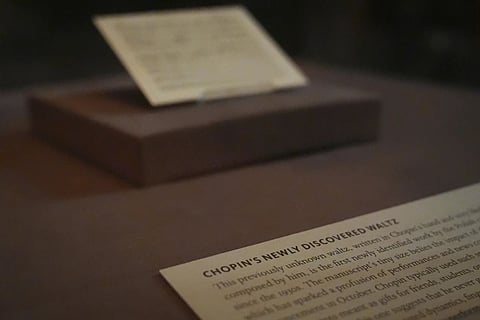
- LIFESTYLE
- FASHION
- FOOD
- ENTERTAINMENT
- EVENTS
- CULTURE
- VIDEOS
- WEB STORIES
- GALLERIES
- GADGETS
- CAR & BIKE
- SOCIETY
- TRAVEL
- NORTH EAST
- INDULGE CONNECT

A newfound waltz linked to Chopin sparks intrigue
A brooding waltz, carefully composed on a manuscript the size of an index card, has set the classical music world abuzz. Recently unearthed at the Morgan Library & Museum in Manhattan, this untitled and unsigned piece bears the intriguing name "Chopin," written at the top in cursive. Though its origins remain uncertain, it’s the first work associated with the Romantic-era composer to come to light in nearly a century.
The discovery was made by museum curator Robinson McClellan while combing through a collection once belonging to Arthur Satz, a former president of the New York School of Interior Design. Satz had acquired the manuscript from A. Sherrill Whiton Jr., an autograph collector and former director of the school.
“This is his style. This is his essence,” McClellan said, describing the piece's stormy opening that transitions into a lyrical, melancholic melody characteristic of Chopin’s compositions. Despite its brevity—lasting less than a minute—the waltz’s intricate details and mood align with the composer’s hallmark style.
McClellan worked with experts to assess the manuscript’s authenticity. Handwriting analysis revealed that the name “Chopin” was written by someone else, but the ink and paper match materials from the early 19th century, a period during which Chopin lived and composed.
Artur Szklener, director of the Fryderyk Chopin Institute in Warsaw, agreed the materials were consistent with those used by Chopin during his early Parisian years. However, he noted certain unusual aspects, describing the piece as more of a “musical gesture” or theme rather than a complete work.
“It evokes the brilliant style that defined Chopin but contains simple piano techniques more aligned with a virtuoso exercise,” Szklener explained. He speculated it could be a work-in-progress, a copy of another composer’s piece, or a collaborative effort with a student.
Jeffrey Kallberg, a University of Pennsylvania professor and Chopin expert, suggested the waltz might have been a personal gift for a friend or wealthy patron.
“Chopin often wrote short pieces as ‘appetisers’ to his full compositions,” Kallberg noted. “This could be one of those, though we may never know if he intended it to be published.”
David Ludwig, dean of music at The Juilliard School, echoed this sentiment. While not involved in authenticating the manuscript, Ludwig acknowledged its brevity and lyrical quality as fitting Chopin’s style.
“It has the character of his work—melancholy yet lyrical,” Ludwig remarked. “Whether or not it’s truly his, it sparks the imagination and reminds us that classical music remains a living art form.”
Born in Poland in 1810, Frederic Chopin was a musical prodigy celebrated for his emotive compositions. He spent his final years in Paris, where he died in 1849 at the age of 39, likely from tuberculosis. His grave lies in Père Lachaise Cemetery, though his heart, preserved in alcohol, rests in Warsaw per his dying wish.
The newfound waltz adds a tantalising layer to his legacy. While its true origins may remain shrouded in mystery, the discovery has reignited appreciation for the Romantic genius.
The revelation follows a similar recent find: in September, Leipzig Municipal Libraries in Germany unveiled a previously unknown piece likely composed by a young Wolfgang Amadeus Mozart. These discoveries underscore the enduring allure of unearthing lost treasures in the world of classical music.
Visitors to the Morgan Library can view the enigmatic Chopin manuscript this month, where it continues to captivate audiences with its delicate balance of certainty and ambiguity—a true echo of the composer’s timeless artistry.